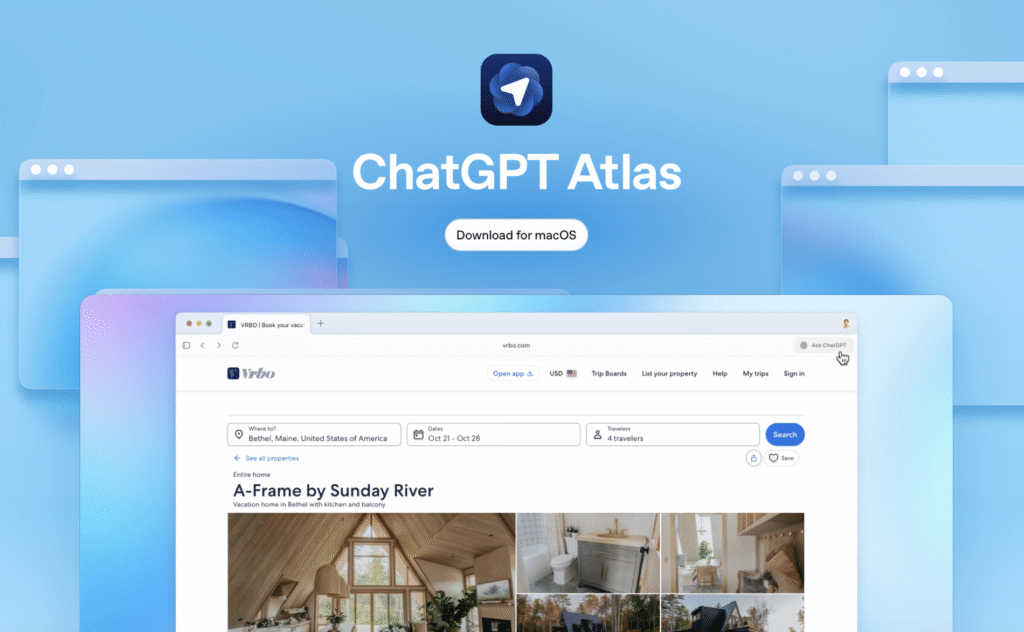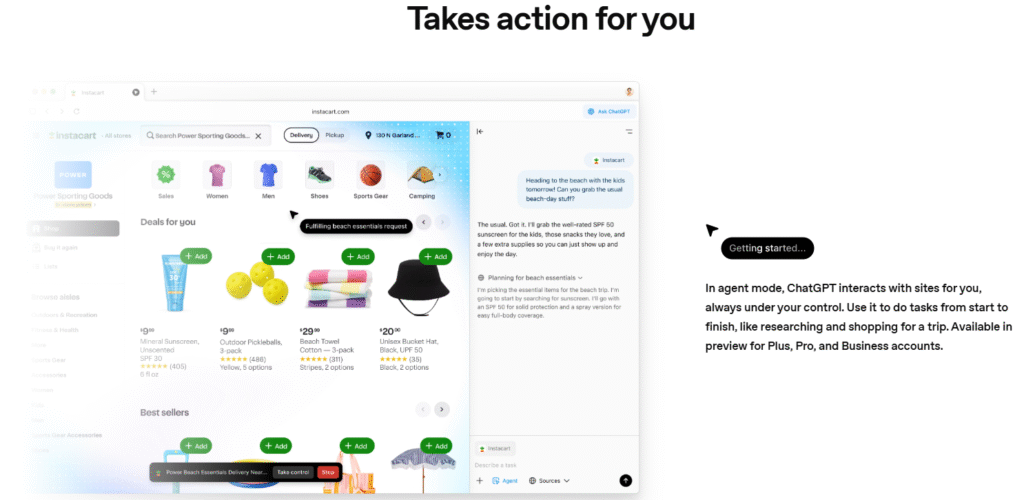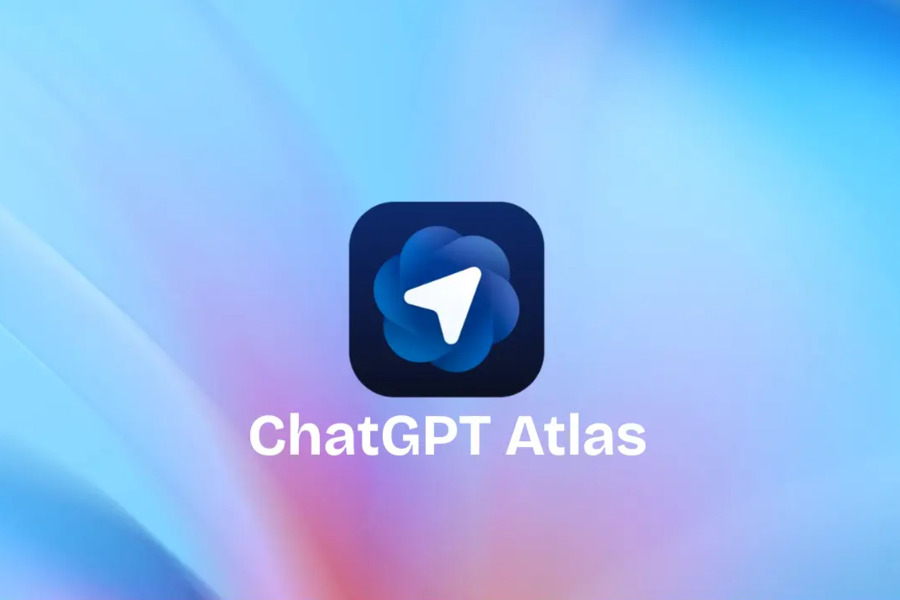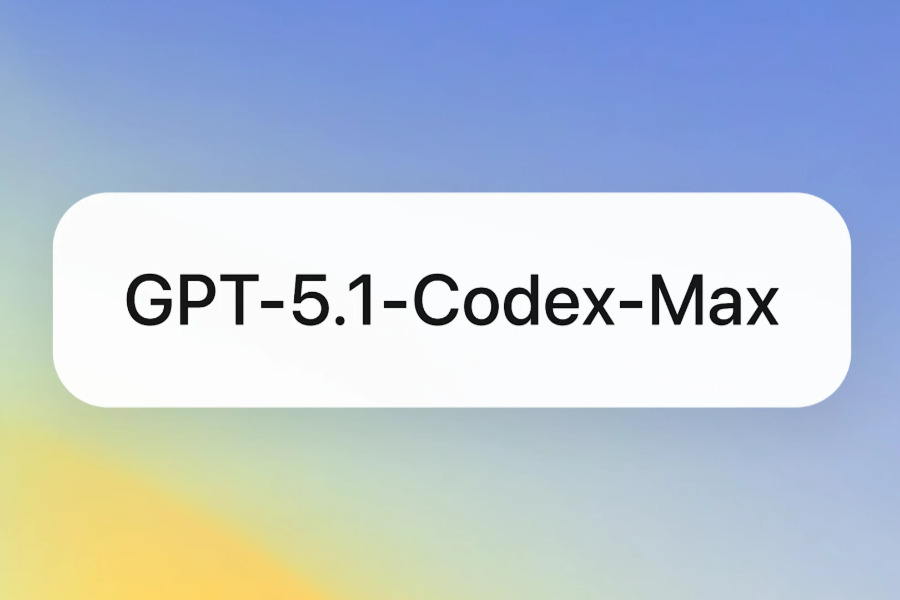OpenAI has officially launched ChatGPT Atlas, a new AI-native web browser built on the Chromium engine, signaling a major strategic expansion from its roots as a conversational AI provider to becoming a full-fledged internet platform.
This move integrates artificial intelligence at the core of the web browsing experience, offering users a more interactive and automated way to navigate the internet.
Introducing ChatGPT Atlas

ChatGPT Atlas represents a fundamental shift from traditional web browsers. Unlike conventional options, it embeds the full power of ChatGPT directly into every browsing tab. This integration provides real-time capabilities such as content summarization, in-depth product comparisons, and instant data analysis. A persistent AI sidebar is accessible on any webpage, allowing users to engage in a dialogue about the content they are viewing.
For instance, instead of manually scanning a dense corporate earnings report, a user can ask Atlas to instantly extract key financial metrics. Similarly, when shopping online, the AI can compare detailed product specifications across different e-commerce sites in seconds.
The browser is initially available for macOS users across all subscription tiers: Free, Plus, Pro, and Business. OpenAI has confirmed that versions for Windows, iOS, and Android are in active development and will be released in the near future, ensuring broad cross-platform availability.
The overarching vision for Atlas is to position it not just as a window to the web, but as an intelligent, interactive layer on top of it. By making advanced AI constantly available, Atlas facilitates a more efficient and analytical browsing experience, moving beyond simple link retrieval to complex, context-aware information processing.
Get started with ChatGPT Atlas
What is Agent Mode in ChatGPT Atlas?

The most innovative feature of ChatGPT Atlas is undoubtedly its Agent Mode. Currently available as an experimental preview for Plus, Pro, and Business subscribers, this functionality represents a leap in AI-driven automation.
Agent Mode enables the ChatGPT AI to autonomously execute multi-step, complex tasks within the browser environment. Rather than simply providing answers or a list of links, users can issue high-level commands and watch as the AI performs the intricate operations required.
A command like “Plan and book a weekend trip to Paris” would trigger the Agent to open new tabs, search for flights across multiple airlines, compare prices and itineraries, and even proceed to add the selected flights to a shopping cart—all without requiring step-by-step guidance from the user.
In a demonstrated use case, the Agent successfully handled the command, “Generate a shopping list from this recipe and order the ingredients.” The AI navigated to a grocery delivery service like Instacart, populated the cart with the correct items, and proceeded to the checkout page, completing a task that would typically take a user several minutes in just a fraction of the time.
A critical design principle of Agent Mode is maintaining user oversight. Throughout any automated process, users have full control. A prominent “Take Over” button allows for immediate manual intervention, while a red “Stop” button can halt the operation instantly. Furthermore, the AI is programmed to seek explicit user confirmation before executing any critical action, such as finalizing a payment, ensuring that human judgment remains the final authority.
For security, the Agent’s capabilities are strictly confined to the browser sandbox. It cannot access local files on the user’s device, execute system-level code, or install extensions. This approach mitigates significant risks while allowing for powerful web-based automation. When compared to earlier, more simplistic automation tools from other companies, Atlas’s Agent Mode is notably faster and leverages the full context of the browsing session to improve accuracy.
Security and Privacy Safeguards in ChatGPT Atlas
Recognizing the inherent risks associated with an autonomous browsing agent, OpenAI has implemented a robust framework of security and privacy safeguards centered on data isolation and user control.
A key privacy assurance is that activity within Agent Mode is not automatically saved to the user’s main ChatGPT conversation history. More importantly, OpenAI has stated that, by default, all data generated during these autonomous sessions is not used to train its AI models. Enterprise and Business customers benefit from an absolute data exemption, ensuring their commercial activities remain entirely confidential.
The browser also introduces an optional feature called “Browser Memory.” When activated, this allows Atlas to retain context and information across different browsing sessions to provide a more personalized experience. Users maintain complete transparency and control over this memory, with the ability to view, archive, or delete stored data at any time to prevent unwanted data persistence.
Existing parental control features from the main ChatGPT platform have been integrated into Atlas. This allows family administrators to disable advanced functionalities like Agent Mode or Browser Memory, making the browser a safer tool for younger users.
Despite these advanced capabilities, OpenAI is candid about the technology’s current limitations. The company explicitly advises users to remain vigilant and actively monitor the AI’s actions, especially during sensitive transactions involving personal data or financial details, as the Agent Mode is an experimental feature and not infallible.
Final Thoughts on ChatGPT Atlas
The launch of ChatGPT Atlas presents a direct and substantial challenge to the established dominance of browsers like Google Chrome. By seamlessly merging intelligent search with actionable execution in a single Agent Mode, Atlas has the potential to significantly accelerate the industry-wide transition towards AI-centric internet interaction.
When positioned against other AI-enhanced browsers such as Perplexity’s Comet, Brave, or Opera’s Neon, Atlas differentiates itself by prioritizing deep, autonomous task completion within the cohesive OpenAI ecosystem. While competitors may focus on augmenting search results or offering standalone AI tools, Atlas is pioneering the end-to-end automation of complex online workflows.
Read More: OpenAI Launches GPT-5 Pro API



